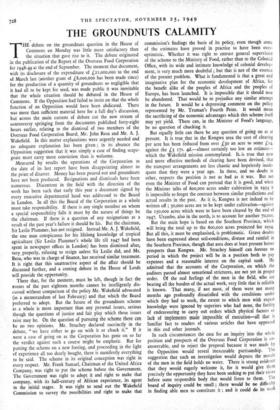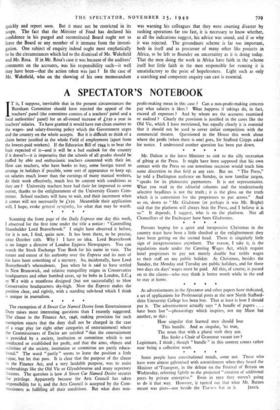THE GROUNDNUTS CALAMITY
THE debate on the groundnuts question in the House of Commons on Monday was little more satisfactory than the situation that gave rise to it. The debate originated in the publication of the Report of the Overseas Food Corporation for 1948-49 at the end of September. The moment that document, with its disclosure of the expenditure of L21,000,000 to the end of March last (another grant of £8,000,000 has been made since) for the production of a quantity of groundnuts so negligible that it had all to be kept for seed, was made public it was inevitable that the whole situation should be debated in the House of Commons. If the Opposition had failed to insist on that the whole function of an Opposition would have been abdicated. There was more than sufficient material here for a full day's discussion, but across the main current of debate cut the new stream of controversy springing from the documents published forty-eight hours earlier, relating to the dismissal of two members of the Overseas Food Corporation Board, Mr. John Rosa and Mr. A. J. Wakefield. In this matter explanations were urgently needed and no adequate explanation has been given ; in its absence the Opposition suggestion that it was simply a case of finding scape- goats must carry more conviction than is welcome.
Measured by results the operations of the Corporation to the date of its last report have been disappointing almost to the point of disaster. Money has been poured out and groundnuts have not been produced. Resignations and dismissals have been numerous. Discontent in the field with the direction of the work has been such that early this year a document signed by every executive departmental head was addressed to the Board in London. In all this the Board of the Corporation as a whole must take responsibility. If there is any single member on whom a special responsibility falls it must by the nature of things be the chairman. If there is a question of any resignations as a result of the past year's failure it should be his. But the chairman, Sir Leslie Plummer, has not resigned. Instead Mr. A. J. Wakefield, the one man conspicuous for his lifelong knowledge of tropical agriculture (Sir Leslie Plummer's whole life till 1947 had been spent in newspaper offices in London) has been dismissed after, very, properly, refusing to resign unless Sir Leslie did, and Mr. Rosa, who was in charge of finance, has received similar treatment. It is right that this unattractive aspect of the affair should be discussed further, and a coming debate in the House of Lords will provide the opportunity.
There that, for the moment, must be left, though in fact the events of the past eighteen months cannot be intelligently dis- cussed without comparison of the policy Mr. Wakefield advocated (in a memorandum of last February) and that which the Board preferred to adopt. But the future of the groundnuts scheme as a whole is more important than any personal issues, serious though the questions of justice and fair play which those issues raise may be. On the question of pursuing the scheme there can be no two opinions. Mr. Strachey declared succinctly in the debate, "we have either to go on with it or chuck it." If it were a case of going on as the Corporation has gone on so far the verdict against such a course might be emphatic. But for putting the scheme on a new footing, and proceeding in the light of experience all too dearly bought, there is manifestly everything to be said. The scheme in its original conception was right in every respect. Mr. Frank Samuel, Chairman of the United Africa Company, was right to put the scheme before the Government. The Government was right to adopt it and right to make that company, with its half-century of African experience, its agent in the initial stages. It was right to send out the Wakefield Commission to survey the possibilities and right to make that commission's findings the basis of its policy, even though some of the estimates have proved in practice to have been over- optimistic. Whether it was right to entrust general supervision of the scheme to the Ministry of Food, rather than to the Colonial Office, with its wide and intimate knowledge of colonial develop. ment, is very much more doubtful ; but that is not of the essence of the present problem. What is fundamental is that a great and imaginative plan for the economic development of Africa, for the benefit alike of the peoples of Africa and the peoples of Europe, has been launched. It is impossible that it should now be abandoned. That would be to prejudice any similar attempt in the future. It would be a depressing comment on the policy represented by Mr. Truman's Fourth Point. It would mean the sacrificing of the economic advantages which this scheme itself may yet yield. There can, in the Minister of Food's language, be no question of chucking it.
But equally little can there be any question of going on as at present. It is true that in the Kongwa area the cost of clearing per acre has been reduced from over 3o an acre to some £14, against the £3 17s. 4d.—almost certainly too low an estimate— which the Wakefield mission contemplated. It. is true that new and more effective methods of clearing have been devised, that the transport arrangements are less chaotic and hopelessly inade- quate than they were a year ago. In these, and no doubt in other, respects the position is not as bad as it was. But not even the Minister of Food can pretend that it is good, and when the Minister talks of 600,000 acres under cultivation in 1954 it is impossible to forget the contrast between similar predictions and actual results in the past. As it is, Kongwa is not indeed to be written off ; 5o,000 acres are to be kept under cultivation—against the 15o,000 acres which were to have been cleared by the end of 1947. Urambo, also in the north, is to account for another 70,000.
But the main hope is based on the Southern Province, which will bring the total up to the 600,000 acres projected for 1954. But all this, it must be emphasised, is problematic. Grave doubts have been expressed about soil-conditions, disease and rainfall in the Southern Province, though that area does at least present better prospects than Kongwa. Mr. Strachey himself can foresee no period in which the project will be in a position both to pay expenses and a reasonable interest on the capital sunk. He admitted that the accounts of the Corporation, on which the auditors passed almost sensational strictures, are not yet in proper order. Of the real feelings of the men in the field, who are bearing all the burden of the actual work, very little that is reliable is known. That many, if not most, .of them were not many months ago profoundly dissatisfied with the conditions under which they had to work, the extent to which men with expert knowledge were ignored by superiors who had none, the futility of endeavouring to carry out orders which physical factors or lack of implements made impossible of execution—all that is familiar fact to readers of various articles that have appeared in this and other journals.
In such circumstances the case for an inquiry into the whole position and prospects of the Overseas Food Corporation is un- answerable, and to reject the proposal because it was made by the Opposition would reveal inexcusable partisanship. The suggestion that such an investigation would depress the morale of the men in the field holds no water. There is strong evidence that they would eagerly welcome it, for it would give them precisely the opportunity they have been seeking to put their views before some responsible body that would listen to them. The board of inquiry could be small ; there would be no difficulty in finding able men to constitute it ; and it could do its work quickly and report soon. But it must not be restricted in its scope. The fact that the Minister of Food has declared his confidence in his purged and reconstituted Board ought not to leave the Board or any member of it immune from the investi- gation. One subject of enquiry indeed ought most emphatically to be the circumstances which led to the dismissal of Mr. Wakefield and Mr. Rosa. If in Mr. Rosa's case it was because of the auditors' comments on the accounts, was his responsibility such—it well may have been—that the action taken was just ? In the case of Mr. Wakefield, who on the showing of his own memorandum was warning his colleagues that they were courting disaster by rushing operations far too fast, it is necessary to know whether, as all the indications suggest, his advice was sound, and if so why it was rejected. The groundnuts scheme is far too important, both in itself and as precursor of many other like projects in Africa, to be left to flounder on uncertainty as it is doing today. That the men doing the work in Africa have faith in the scheme itself but little faith in the men responsible for running it is unsatisfactory to the point of hopelessness. Light such as only a searching and competent enquiry can cast is essential.







































 Previous page
Previous page